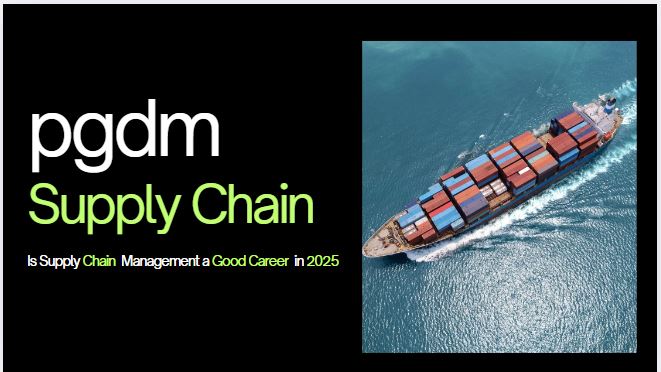
In today’s interconnected world, Supply Chain Management (SCM) plays a pivotal role in how goods and services move—from raw materials to end consumers. Post-COVID-19, global disruptions like trade wars, labor shortages, and unpredictable demand have underscored the need for resilient and efficient supply chains. As businesses race to future-proof operations, Supply Chain Management careers in 2025-26 are seeing unprecedented growth.
For aspiring professionals, career switchers, and students, this field offers a mix of stability, innovation, and global relevance. And with the rise of online learning, institutions like MIT School of Distance Education (MITSDE) are making it easier than ever to upskill in SCM and logistics.
Why Supply Chain Management Is a High-Demand Career in 2025-26
From skyrocketing e-commerce to digitally driven logistics systems, the demand for supply chain experts is rising globally. Businesses rely on SCM for everything—product availability, cost control, customer satisfaction, and sustainability goals.
According to industry reports, the global logistics market is projected to exceed $14 trillion by 2028, and the demand for professionals with expertise in planning, procurement, and supply chain analytics continues to grow. Yet, there’s a shortage of skilled professionals, opening doors for newcomers and experienced individuals alike.
Key roles in demand include:
- Supply Chain Analyst
- Logistics Manager
- Procurement Specialist
- Inventory Control Manager
- Operations Planner
With global trade booming and companies focusing on local sourcing and risk management, the career potential in SCM is stronger than ever in 2025-26.
Skills You Need to Succeed in Supply Chain Management Today
To thrive in supply chain roles, professionals need a combination of technical know-how and soft skills:
- Analytical thinking for problem-solving and process optimization
- Data interpretation & forecasting to predict demand and avoid stockouts
- Tech-savviness, including familiarity with ERP systems, SAP, and AI tools
- Communication & negotiation for managing vendor and stakeholder relationships
- Risk management & strategic planning to minimize disruptions and build resilience
Many online supply chain management courses are designed to equip learners with these industry-relevant skills, step-by-step—making them job-ready and future-proof.
How Online Supply Chain Management Courses Can Shape Your Career
Online learning has transformed the way professionals grow their careers. With MITSDE’s online SCM programs, students get the flexibility to learn while working, gaining access to global best practices, real-world case studies, and digital tools.
Whether you prefer self-paced learning or an instructor-led structure, MITSDE offers options tailored to different learning styles. Importantly, employers increasingly recognize the value of logistics and supply chain management certifications, especially those aligned with industry demands.
Highlights of MITSDE’s Online SCM & Logistics Programs:
- Interactive curriculum with live projects and simulations
- Case studies based on real-world supply chain challenges
- Mentorship from industry professionals
- Convenient learning schedule
- AICTE-approved PGDM and Certificate programs
Logistics and Supply Chain Management Certifications to Watch in 2025-26
In 2025-26, certifications continue to play a critical role in career growth and credibility within SCM. They not only validate your expertise but also help you stay updated with evolving industry trends.
Global Certifications via MITSDE:
- PG Diploma in Supply Chain Management
- Execuitive PG Diploma in Supply Chain Management
- PG Certificate in Logistics Management
These programs align with industry standards and are designed to build competencies that employers are actively seeking in 2026 and beyond.
Career Paths and Job Opportunities After Certification
Once certified, numerous career paths open up based on your interests and experience level:
Entry-Level Roles:
- Procurement Executive
- Inventory Planner
- Logistics Coordinator
Mid-Level Roles:
- Supply Chain Analyst
- Warehouse Manager
- Distribution Supervisor
Senior Roles:
- Supply Chain Consultant
- Director of Logistics
- Global Sourcing Manager
Salary prospects also scale with your certification and role. On average, a certified Supply Chain Analyst in India can earn between ₹6–10 LPA, while senior roles can go upwards of ₹20 LPA.
MITSDE alumni have successfully transitioned into SCM careers across industries—retail, manufacturing, e-commerce, and healthcare—thanks to the practical, job-ready curriculum.
Why Choose MITSDE for Your SCM Journey?
Choosing the right learning partner can make all the difference. Here’s why MITSDE stands out:
- AICTE-approved and widely recognized in industry circles
- A curriculum designed with input from industry veterans
- 100% online flexibility—ideal for working professionals
- Mentorship, career counseling, and placement support
- Focus on skill-based learning with real-time applications
- Success stories and testimonials from past learners
Whether you’re starting fresh or switching careers, MITSDE helps you take that leap with confidence.
Conclusion: SCM Is Not Just a Good Career—It’s a Future-Proof One
The world relies on supply chains more than ever before. From ensuring everyday essentials to enabling innovation and sustainability, Supply Chain Management careers in 2025-26 are central to economic resilience and growth.
With the right skillset and certifications, you can unlock high-paying, impactful roles across industries—and MITSDE is here to guide you every step of the way.



